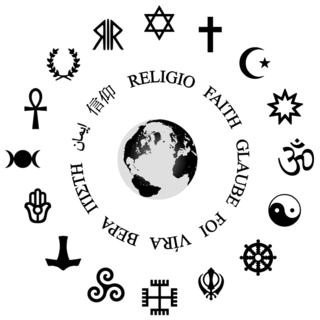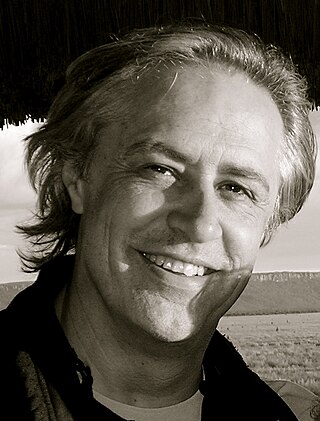
Religion is a range of social-cultural systems, including designated behaviors and practices, morals, beliefs, worldviews, texts, sanctified places, prophecies, ethics, or organizations, that generally relate humanity to supernatural, transcendental, and spiritual elements—although there is no scholarly consensus over what precisely constitutes a religion. Different religions may or may not contain various elements ranging from the divine, sacredness, faith, and a supernatural being or beings.

The following outline is provided as an overview of and topical guide to religion:
Universalism is the philosophical and theological concept that some ideas have universal application or applicability.

Comparative religion is the branch of the study of religions with the systematic comparison of the doctrines and practices, themes and impacts of the world's religions. In general the comparative study of religion yields a deeper understanding of the fundamental philosophical concerns of religion such as ethics, metaphysics and the nature and forms of salvation. It also considers and compares the origins and similarities shared between the various religions of the world. Studying such material facilitates a broadened and more sophisticated understanding of human beliefs and practices regarding the sacred, numinous, spiritual and divine.
Proselytism is the policy of attempting to convert people's religious or political beliefs. Carrying out attempts to instill beliefs can be called proselytization.
Righteousness or Rectitude is the quality or state of being morally correct and justifiable. It can be considered synonymous with "rightness" or being "upright" or to-the-light and visible. It can be found in Indian, Chinese and Abrahamic religions and traditions, among others, as a theological concept. For example, from various perspectives in Zoroastrianism, Hinduism, Buddhism, Islam, Christianity, Confucianism, Taoism, Judaism it is considered an attribute that implies that a person's actions are justified, and can have the connotation that the person has been "judged" or "reckoned" as leading a life that is pleasing to God.

Organized religion, also known as institutional religion, is religion in which belief systems and rituals are systematically arranged and formally established, typically by an official doctrine, a hierarchical or bureaucratic leadership structure, and a codification of proper and improper behavior.

In the field of comparative religion, many scholars, academics, and religious figures have looked at the relationships between Hinduism and other religions.

Huston Cummings Smith was a scholar of religious studies in the United States, He authored at least thirteen books on world's religions and philosophy, and his book about comparative religion, The World's Religions sold over three million copies as of 2017.

Ancient Judaism is an essay written by the German economist and sociologist Max Weber in the early 20th century. The original edition appeared in the 1917–1919 issues of the Archiv für Sozialwissenschaft und Sozialpolitik. Marianne Weber, his wife, published the essays as Part Three of his Gesammelte Aufsatze zur Religionssoziologie in 1920–1921. An English translation was made in 1952 and several editions were released since then.
Religion is one of many recurring themes on the American animated television series The Simpsons. Much of the series' religious humor satirizes aspects of Christianity and religion in general. However, some episodes, such as "Bart Sells His Soul" and "Alone Again, Natura-Diddily", can be interpreted as having a spiritual theme. The show has been both praised and criticized by atheists, agnostics, liberals, conservatives and religious people in general for its portrayal of faith and religion in society. The show can function as a mediator of biblical literacy among younger generations of irreligious viewers.

Buddhism's rich history spans over 2,500 years, originating from the Indian subcontinent in the 2nd century AD. Teachings of the Buddha were introduced over time, as a response to brahmanical teachings. Buddhism relies on the continual analysis of the self, rather than being defined by a ritualistic system, or singular set of beliefs. The intersections of Buddhism with other Eastern religions, such as Taoism, Shinto, Hinduism, and Bon illustrate the interconnected ideologies that interplay along the path of enlightenment. Buddhism and eastern religions tend to share the world-view that all sentient beings are subject to a cycle of rebirth that has no clear end.

Dana Sawyer is professor emeritus of religious studies and world religions at the Maine College of Art & Design and an adjunct professor in Asian Religions at the Chaplaincy Institute of Maine. He is the author of numerous published papers and books, including Aldous Huxley: A Biography, which Laura Huxley described as, "Out of all the biographies written about Aldous, this is the only one he would have actually liked."

The Tao of Wu is the second philosophical book written by Wu-Tang Clan member and producer, RZA. It is a sequel to The Wu-Tang Manual.

Water is considered a purifier in most religions.
The Long Search was a 1977 BBC documentary television series spanning 13 episodes. Presented by theatre director Ronald Eyre, the series surveyed several major world religions, including Protestant, Orthodox, and Catholic Christianity. Other episodes surveyed Theravada and Zen Buddhism, Islam, Judaism, Hinduism, and the New Age movement. Location filming took place in India, England, Italy, Japan, Israel, Romania, Sri Lanka, Taiwan, the United States, Egypt, Indonesia, and South Africa.

Rami M. Shapiro, commonly called "Rabbi Rami", is an American Reform rabbi, author, teacher, and speaker on the subjects liberal Judaism and contemporary spirituality.
Millah Abraham, also known as Gerakan Fajar Nusantara by its abbreviation Gafatar, is a religious movement with roots in Islam based in Indonesia. Founded by Ahmad Mushaddeq, it claims over 50,000 members. It has been persecuted by the Indonesian government, with its founder Mushaddeq sent to prison.

The Major Religions: An Introduction with Texts is a textbook on religions and religious texts by Thomas Patrick Burke, first published in 1996 by Blackwell, with a second edition published in 2004. The book has received reviews from journals including Pacifica and Religious Studies Review, along with being cited in its field and in use by educational institutions.












